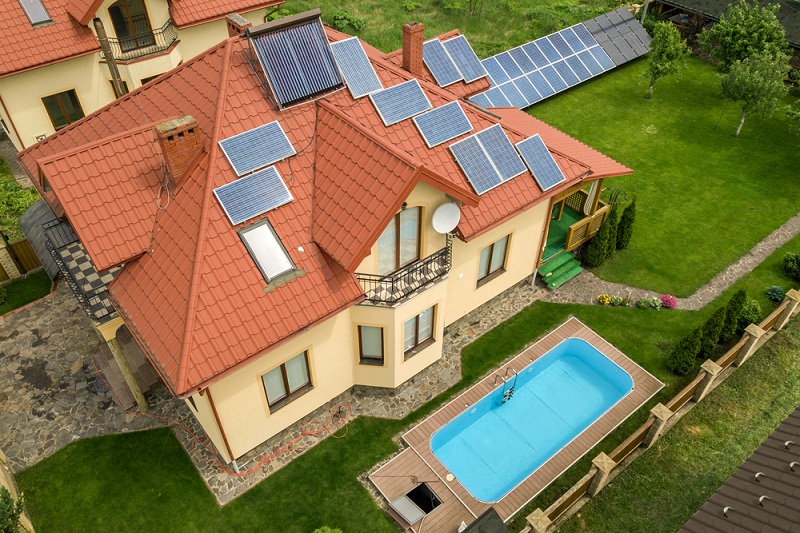Installing a solar-powered pool heater is an excellent idea for keeping your pool warm during cold weather and helping you reduce your electricity bill.
They’re affordable, cheap, and often last longer than other heating systems. They’re also flexible enough to work with both outdoor and indoor swimming pools of varying sizes.
In this article,
we'll explain how solar pools heat water, how much they cost (and if they're worth it), and whether or not investing is right for you.
How do solar pool heaters work?
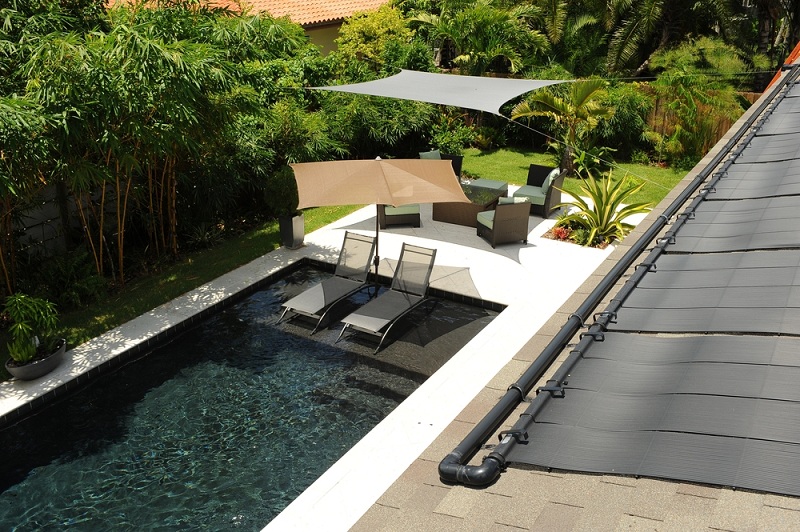
Water is first pumped out of the swimming pools through a filtration system, then to a solar collector, where solar energy is used to heat the water before returning it to the swimming pools.
It uses a flow control valve, a check valve, and a temperature sensor to keep the water at an ideal temperature.
A solar heater uses a solar thermal collector, a check valve, a fluid controller (a valve), and a temperature sensor to generate hot water.
It’s generally possible for most systems to automatically detect the temperatures of the water and transfer them to the solar collectors, which will warm up the water before sending it back into the pool.
Once the water has reached the desired pool/solar water heating system temperatures, the flow control valves divert the water flow from the solar collectors directly back into the pools for use.
The solar collectors are normally oversized for pools located in colder regions of North America and those that use their swimming pools all year round. Hence, they can heat the water during periods of low temperatures.
You can use a solar water heater with gas or electric heat if necessary.
Solar Thermal Collecting System
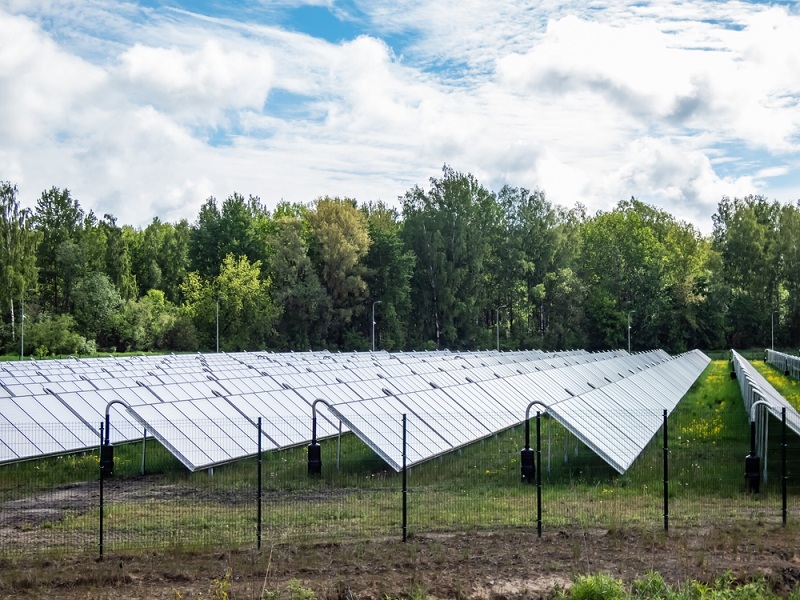
Solar thermal collecting systems harness the thermal energy from sun exposure.
Cold water is pumped into the collector at the bottom. Water heated by the sun rises to the surface, which can then be drawn off for heating water for swimming, building, and homes.
Types of Solar Thermal Collecting Systems
Glazed and unglazed solar thermal collectors are two different kinds of solar thermal collectors.
Glazed Solar Thermal Collectors
Known as flat plate solar collector panels, glazed solar collector panels are encasements made from glass and are usually more complicated in design. They're made from metal (including copper tube and aluminum sheet) under an iron-temper glass cover.
They're able to heat water more efficiently than traditional water heaters and use less space to offer higher heat levels. Glazed solar collectors are suitable throughout the year but are more expensive than unglazed ones.
Unglazed Solar Thermal Collectors
Black plastic or heavy-duty rubber is often used for unglazed solar collectors. They're UV treated to help prolong their lifespan.
While usually cheaper than glazed ones, Unglazed solar collectors are less effective and are limited to warmer climates and swimming pool water whose temperatures don't drop below freezing.
Which size solar thermal collector best fits your house?
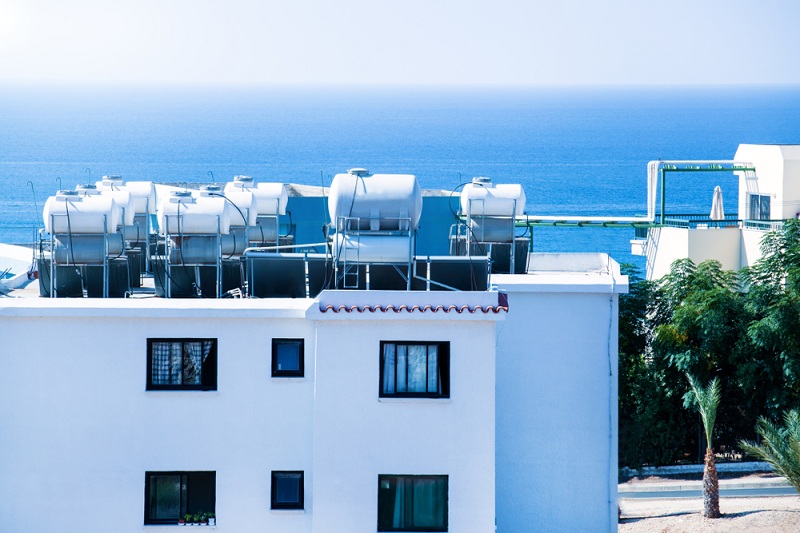
Suppose you're planning to install a solar energy system for your swimming pools, depending on how large your solar collectors are and how hot you want your water to be. In that case, DOE recommends installing them at least half of the total square footage of your swimming pools' surfaces.
For example, suppose a swimming pool is 15 by 20 ft. It has 300 square ft of surface area. As a result, the solar panel needs to be at least 150 sq ft in size.
If homeowners want to maintain their swimming pools throughout the year, they should look into installing a solar collector that is at least as large as the pool itself.
For example, typical 15-by-30-foot indoor swimming pools require a collector that equals 100% of the square footage to allow continuous use throughout the year. This means 450 square feet of collector space.
Most people who live in Northern California use swimming pools outdoors for 6–8 months out of the year, so they usually install a system that covers between 60%–70% of the total surface area.
What is the cost of Installation and running of a Solar Pool Heater?
A fully installed solar pool heating system costs between $3000 and $4000. However, they pay back their initial investment between 1-2 years in terms of reduced electricity bills.
If you want to use solar energy to run your swimming pools' water pumps, you may be able to save some money by using a solar-powered version. Conventional swimming pool water pumps typically range from $1,000 to $3,000.
Solar Pool Heaters: Why Should You Consider Making the Switch?
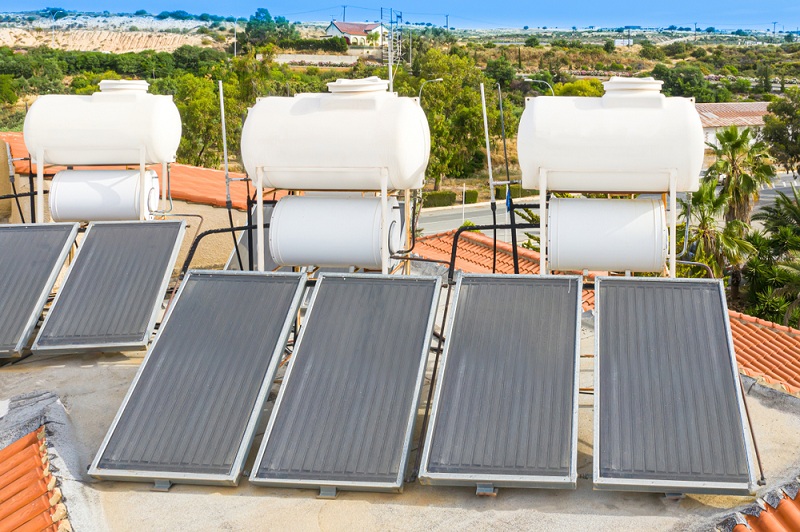
Because solar pool heaters are more passive than electric or natural-fuel pool heaters, they tend to be more durable.
Read more about the differences between passive and active solar heaters here.
Solar-powered pool heaters use only solar energy to pump the heated water into the swimming pool, effectively using less energy than electricity or gas-powered systems.
Energy is required to power electric or natural-fueled swimming pool pumps, filters, and heaters. Solar pools use solar energy to power all their components. As a result, they're significantly cheaper than conventional heating systems.
Solar-powered swimming pools pay for themselves within 1.5 to 7-year periods, according to the U.S. Department of Energy (DOE).
Making the Most of the Solar Pool Heater Installation
Simple steps, such as using a pool cover to keep heat in, can significantly lower the cost of operating a swimming pool heater.
Pool covers absorb more heat from sunlight and transmit it to the pool surface, where it heats the water.
There are several other possible ways to add some extra warmth to the pool, including using solar sun rings. They're floating on top of a swimming pool and providing small amounts of heat.
A solar pool heater requires electrical and plumbing work, so it is advisable to hire an expert to install it properly, especially if you're planning to put it on your roof.
Solar contractors and swimming pool contractors can install solar energy systems; however, solar contractors will be aware of any nearby solar rebates and incentives.

